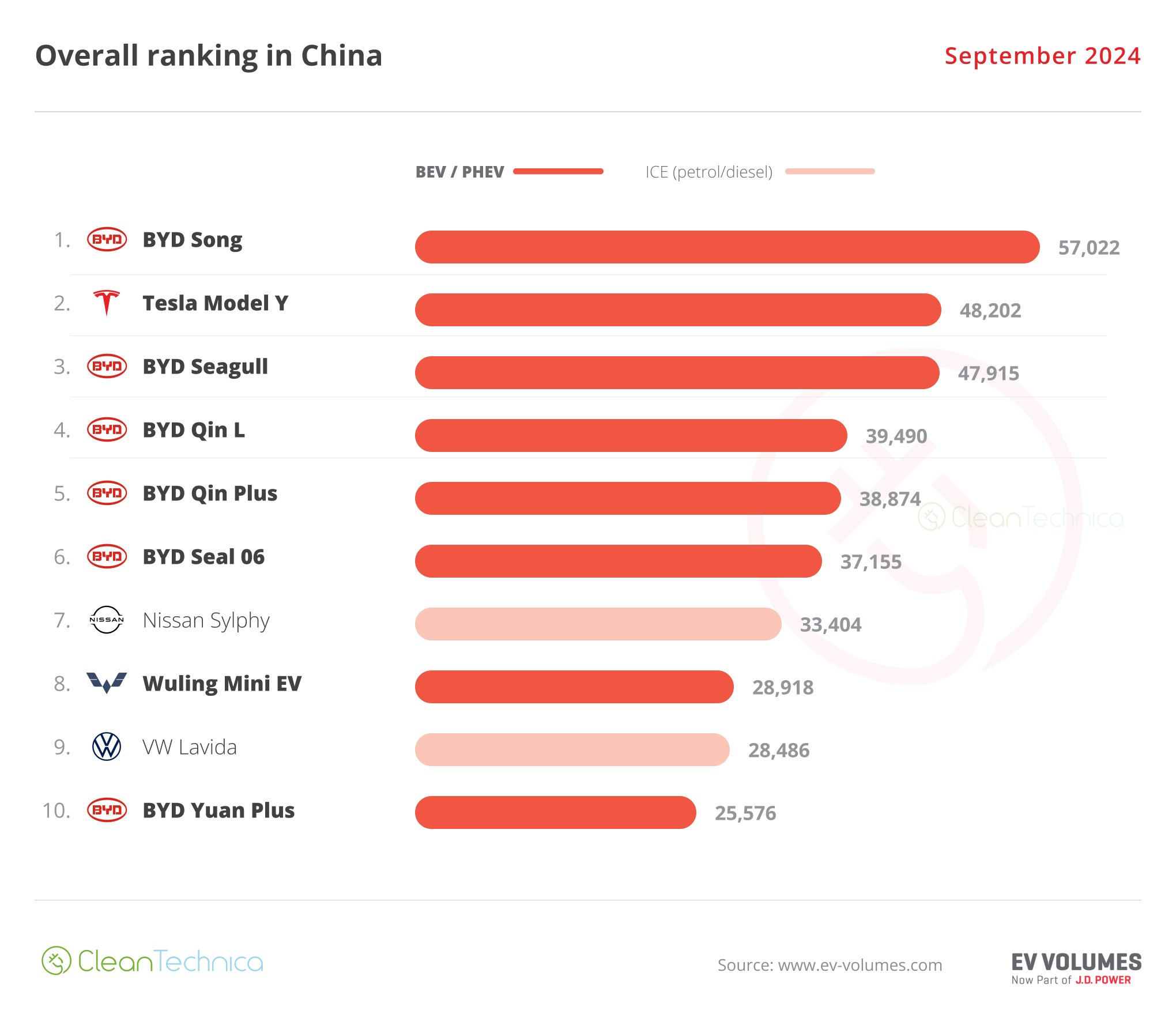Sign up for daily news updates from CleanTechnica on email. Or follow us on Google News!
[Update: Tesla just announced Q1 2024 sales, and they are bad, even well below market estimates. More coming on this.] Perhaps as early as today, Tesla will announce how many cars it delivered in the first quarter of 2024. Most analysts expect those numbers to be disappointing. “It’s death by 1,000 cuts,” Karl Brauer, an analyst with ISeeCars.com, told the Washington Post. Musk “has never had a demand problem, but over the past year-plus, there has been increasing indicators that he’s producing more cars than the market wants.”
Industry analysts estimate that deliveries of new cars by Tesla in the first quarter will be about 425,000 vehicles, down from 484,000 in the fourth quarter of 2023, said Daniel Ives, a tech analyst with Wedbush Securities. He said it has been a “nightmare quarter” for Tesla, as Tesla grappled with a “perfect storm” of increased competition from China, waning demand in the overall EV market, and a fire at its factory in Berlin that added more strains on production and deliveries. “This will be not be a moment of celebration for the bulls and instead be a ‘rip the Band-Aid’ quarter for Tesla investors,” Ives said. “For Musk, this is a fork in the road time to get Tesla through this turbulent period, otherwise darker days could be ahead.”
While Elon Musk has cited high interest rates as a major reason why fewer people are buying Tesla automobiles, the company is dealing with a number of lawsuits that have resulted from serious injuries or death associated with the use of Autopilot and Full Self Driving software that failed to perform as advertised. Recently, under prodding from the National Highway Traffic Safety Administration (NHTSA), Tesla has added more prominent warnings to those systems to alert drivers that they need to remain focused on the road ahead when those systems are in use.
Recently, the company has rolled out the latest versions of its Full Self Driving software and Musk has directed his delivery personnel to take all new owners on a test drive to familiarize themselves with what it can and cannot do, and to reinforce what their obligations are when the system is active. “Going forward, it is mandatory in North America to install and activate FSD V12.3.1 and take customers on a short test ride before handing over the car,” Musk wrote in an email to his staff recently. “Almost no one actually realizes how well (supervised) FSD actually works. I know this will slow down the delivery process, but it is nonetheless a hard requirement.”
Some consider this latest version of the software the closest the company has come yet to producing cars that can literally drive themselves, while others see the requirement for a test drive an admission that prior instructions about how to use the system were inadequate. Either way, adding the word “supervised” is an alteration in how the company presents its software to new owners.
Until now, the company seemed to imply its cars were more capable of driving themselves than they were in reality. For years the company featured a video on its website it claimed showed a Tesla literally driving itself with the driver merely along for the ride. The contradiction between what the company said in its owners manual and what it suggested on its website led to confusion among some drivers about what their cars actually were capable of. Confusion behind the wheel often has unfortunate consequences.
Tesla “Consideration Score”
Caliber is a market intelligence company that helps companies understand their strengths and weaknesses in the marketplace. One of the metrics it measures is something it calls a “consideration score” — what percentage of potential customers consider a particular brand or model when making a buying decision. “Listen to stakeholders. Build trust. Stop guessing what people think of your business. Get truly actionable intelligence about your brand and reputation with Caliber, the world’s only real-time stakeholder tracker,” the company says on its website.
On April 1, 2024 (no, that is not a joke), Caliber told Reuters that the consideration score for Tesla has dropped from a high of 70 percent when it first started tracking the company in November 2021 to 31 percent in February of this year. Caliber cited strong associations between Tesla’s reputation and that of Musk for the scores. “It’s very likely that Musk himself is contributing to the reputational downfall,” Caliber CEO Shahar Silbershatz told Reuters, adding that his company’s research shows 83 percent of Americans associate Musk with Tesla.
Reuters says it spoke to five marketing, polling, and car experts, all of whom said controversies surrounding Musk and his increasingly right-wing politics and public statements are weighing on Tesla’s brand and impacting demand for its automobiles. “It is hard enough to win sales without getting into politics,” said Tim Calkins, a marketing professor at Northwestern University’s Kellogg School of Management.
Economic fears, the lack of affordable new models, and rising competition from cheaper rivals like BYD have also been cited by Wall Street analysts as putting pressure on Tesla. Overall, electric vehicle sales in the US are projected to increase 15 percent in the first quarter of this year. However, Tesla sales are projected to increase by just 3 percent according to Cox Automotive. “The EV slowdown is shaping up to be a Tesla slowdown,” said Cox analyst Stephanie Valdez Streaty. California is the biggest market for Tesla in the US, but sales fell in the Golden State in the fourth quarter of 2023 for the first time in three years while sales of electric cars rose overall.
Downhill Since 2022
Musk’s reputation has taken a hit since he purchased Twitter in the fall of 2022. When asked by an investor during a January 2023 conference call if his political comments were hurting Tesla’s brand and sales, Musk said he was “reasonably popular,” referring to his then 127 million followers on X.
According to Brand Finance, a marketing consultant, the reputation of Tesla declined in 2023 in the United States, the Netherlands, France, United Kingdom, and Australia. The only places it did not suffer were China and Germany. A survey by consumer analytics firm CivicScience shared exclusively with Reuters found 42 percent of respondents had an unfavorable view of Musk in February. That’s up from 34 percent in April 2022, which is when Musk disclosed his stake in Twitter. “A modest but growing number of EV shoppers are increasingly put off by Elon Musk’s behavior and politics and are now finding viable alternatives to Tesla in the marketplace,” Ed Kim, president of auto industry consultancy AutoPacific, said.
Elon had some advice for nervous buyers last November when he said, “Whether you hate me, like me or are indifferent, do you want the best car, or do you not want the best car?” That’s exactly the dilemma Kat Beyer, a climate activist in Wisconsin, found herself in last year. She told Reuters she wanted to avoid Tesla because of Musk’s support for Republicans but wound up buying a Model Y because there was a lack of EVs with reliable charging infrastructure. “It’s hard to drive the car associated with him,” Beyer said. “But I can’t go back to gas.”
That’s fine, so long as Tesla makes the best car. There is little doubt that was true five years ago, but since then, Hyundai and Kia have really been pushing the envelope and Chinese automakers are starting to bring their own competitive cars to market. Whether Musk and his outsized personality can continue to keep the Tesla balloon aloft as the company transitions to a mature business model is a question on the minds of many.
Have a tip for CleanTechnica? Want to advertise? Want to suggest a guest for our CleanTech Talk podcast? Contact us here.
Latest CleanTechnica TV Video
CleanTechnica uses affiliate links. See our policy here.




